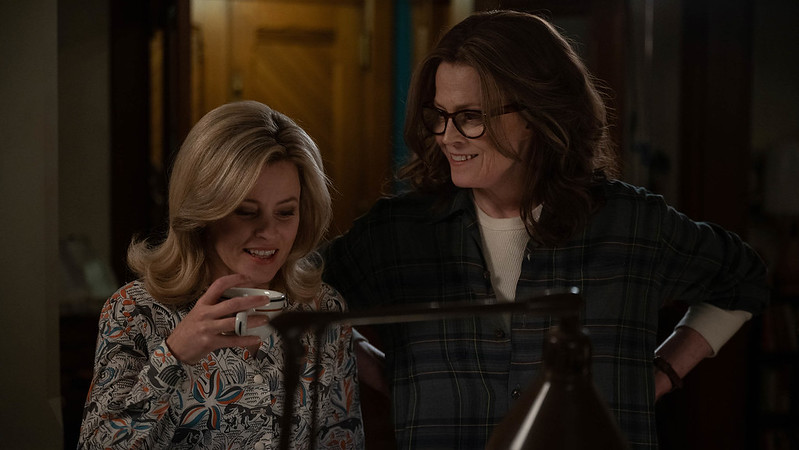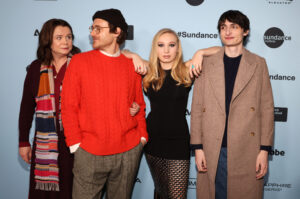By Stephanie Ornelas
We started this editorial series at the beginning of June 2022, looking at films that premiered at the 2022 Sundance Film Festival that examine and champion reproductive freedom. Happening, The Janes, and Aftershock all tell stories of what can happen when women don’t have control of their reproductive healthcare choices. And while the leaked SCOTUS memo from this past May suggested the overturning of Roe v. Wade, the confirmation of this reality on Friday only amplifies our continued fight for women’s rights. Sundance Institute will continue to lift up artists who use their creative freedom to stand up for a woman’s right to choose.
When Roe v. Wade was passed in 1973, three of the judges on the Supreme Court who ruled in favor of the case were conservatives appointed by Richard Nixon. This fact stood out to Sigourney Weaver as she was preparing for her role in the 2022 Sundance Film Festival premiere Call Jane, releasing this October.
Although the judges were conservative, “they understood that the right of a woman to decide for herself whether to bear a child was fundamental to her dignity, to her freedom, and to her health,” Weaver says during the film’s post-premiere Q&A at the Festival back in January.
“It was such a wakeup call to me when I read that because it’s an issue that’s been politicized. This film shows that it’s just about women and, in this case, women rescuing other women from hopelessness and danger. Having lived through that time, believe me, we do not want to go back to that.”
Call Jane tells the fictionalized story of Joy (Elizabeth Banks), a suburban housewife in 1968 who lives an ordinary life with her husband and daughter in Chicago. When her pregnancy leads to a life-threatening heart condition, she must navigate an all-male medical establishment unwilling to terminate her pregnancy in order to save her life. Her journey for what seems like an impossible solution leads her to Virginia (Sigourney Weaver), an independent visionary fiercely committed to women’s health, and Gwen (Wunmi Mosaku), an activist who dreams of a day when all women will have access to abortion, regardless of their ability to pay.

“I was struck by the need to tell this story about women — a story that gave women agency, a story that could do it with humor, a light touch, and some urgency,” says director Phyllis Nagy, as she called attention to the other films at the Festival that center around the same subject.
“There are a number of films [at the 2022 Sundance Film Festival about reproductive rights] because this is an important topic. Films, journalism, cultural artifacts — we should all be in conversation with each other and we should be having an intergenerational conversation, an intersectional conversation. These things are extremely necessary in order for our cherished right to choose not to disappear entirely.”
Banks was immediately attached to this project because of the gravity of the subject. She saw it as a chance to raise awareness and discussion about women’s rights.
“[The film] is urgent. I love working on historical things that have relevance in today’s world, and this obviously does. The Janes were changemakers in their day. I really felt like this was an opportunity for us to shine a light on that activism and more importantly, the camaraderie of the women involved. [This was an opportunity] to celebrate these women who worked together to solve, to evolve, and to help each other. I felt it was very personal for this one character and through that, if we could build empathy for this woman, we could really speak to the audience about larger issues.”
Grace Edwards, who plays Joy’s daughter, did a lot of research on what it was like to be a 16-year-old child in the ’60s as she prepared for this film. “Teenagers were kept very separate from what was going on in the world politically and concerning all the subjects touched on in the film. Children were not really exposed to that kind of thing like we are now. Now, we can talk about it. I would like my generation to watch this film and be aware of the history of these women and what they went through.”

There’s a lot of talk about reproductive rights right now — especially with the recent news of the Supreme Court overturning Roe v. Wade. Because of this, the group shared the ways they hope this film engages with the current conversation about abortion rights and reproductive health. It’s all about putting the focus back on the woman.
“Making abortion illegal isn’t going to stop abortions from happening. What it’s going to do is make them unsafe,” says Mosaku. “If someone wants an abortion, they’re going to get it. So, why take away their dignity and their safety by making it illegal? It’s just going to become dangerous again. I just really want people to know that and have empathy. No one wants to be in this situation. It’s not easy. So give them grace and leave them alone.”
Banks also hopes that more men join the conversation. “I think this film is a joyful representation of women working together, but there’s also some really supportive men in the film as well. And I love that about the relationships we have in the movie and what that says about where we could go with this conversation.”
But more importantly, the group collectively agreed that the fight for abortion is, was, and always has been about a woman’s right to choose. Weaver hopes this film will engage the younger generation and put the focus back on the woman.
“We need to just remind people that there’s a life at stake that’s walking and breathing and trying to make the best decision she can,” says Weaver. “It’s important to respect these choices. You may not agree with them personally, and that’s your choice.”







